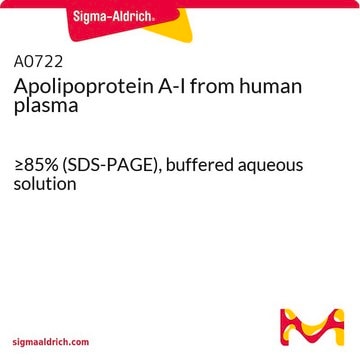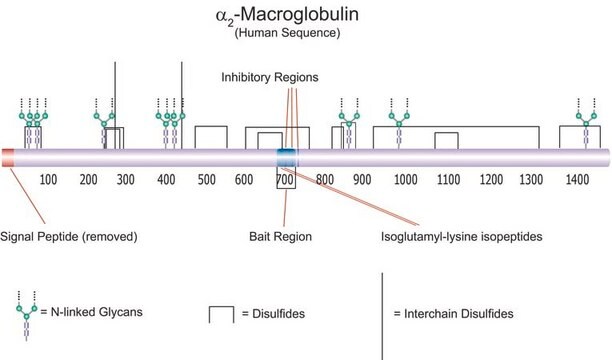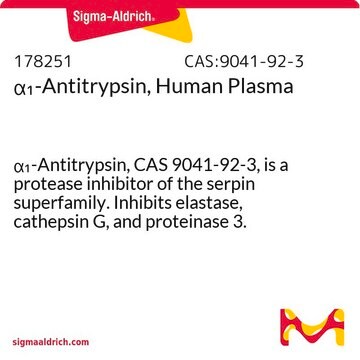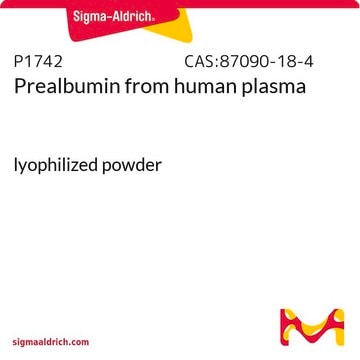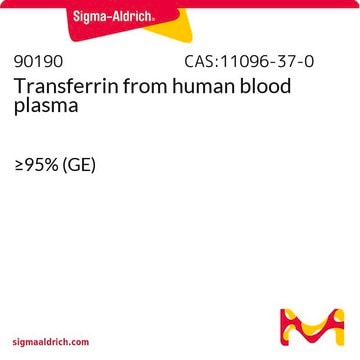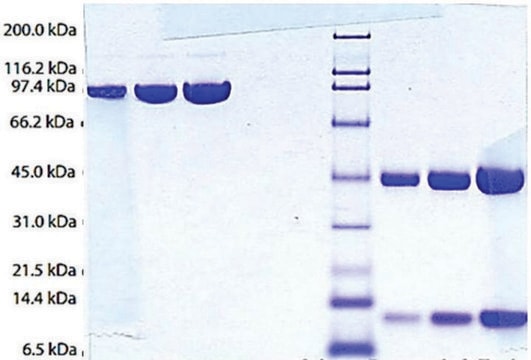SRP6314
Alpha 2 Macroglobulin from human plasma
≥95% (SDS-PAGE)
Synonym(s):
A2M, C3 and PZP-like alpha-2-macroglobulin domain-containing protein 5, CPAMD5, FWP007
Sign Into View Organizational & Contract Pricing
All Photos(1)
About This Item
UNSPSC Code:
12352202
NACRES:
NA.32
Recommended Products
General description
α 2 macroglobulin (A2M) is a major serum protein found at concentrations of 240 mg/100 mL in men and 290 mg/100 mL in women. It is produced by the liver, and is a major component of the α-2 band in protein electrophoresis. It has a molecular weight of 800,000 Da.
Biochem/physiol Actions
α 2 macroglobulin (A2M) functions as a broad-spectrum protease-binding protein. It is a large plasma glycoprotein that has long been known as an irreversible inhibitor of a variety of proteinases. More recently, it has been reported that numerous growth factors, cytokines and hormones bind to α 2M through diverse mechanisms. A2M is also produced in the brain where it binds multiple extracellular ligands and is internalized by neurons and astrocytes. In the brain of Alzheimer′s disease (AD) patients, A2M has been localized to diffuse amyloid plaques. A2M also binds soluble β-amyloid, of which it mediates degradation. Clinically, levels are increased in liver cirrhosis, nephrotic syndrome, diabetes, and severe burn cases.
Physical form
Lyophilized from 30 mM Na Phosphate, pH 7.0, with glycine as a stabilizer.
Reconstitution
In water or aqueous buffer
Storage Class Code
11 - Combustible Solids
WGK
WGK 3
Flash Point(F)
Not applicable
Flash Point(C)
Not applicable
Certificates of Analysis (COA)
Search for Certificates of Analysis (COA) by entering the products Lot/Batch Number. Lot and Batch Numbers can be found on a product’s label following the words ‘Lot’ or ‘Batch’.
Already Own This Product?
Find documentation for the products that you have recently purchased in the Document Library.
Customers Also Viewed
Interleukin-6 and alpha-2-macroglobulin indicate an acute-phase state in Alzheimer's disease cortices.
Bauer J
Febs Letters, 285, 111-114 (1991)
The interaction of alpha 2-macroglobulin with proteinases. Characteristics and specificity of the reaction, and a hypothesis concerning its molecular mechanism.
Barrett AJ and Starkey PM
The Biochemical Journal, 133, 709-724 (1973)
Jennifer L Robinson et al.
Scientific reports, 8(1), 8527-8527 (2018-06-06)
Temporomandibular joint degenerative disease (TMJ-DD) is a chronic form of TMJ disorder that specifically afflicts people over the age of 40 and targets women at a higher rate than men. Prevalence of TMJ-DD in this population suggests that estrogen loss
Our team of scientists has experience in all areas of research including Life Science, Material Science, Chemical Synthesis, Chromatography, Analytical and many others.
Contact Technical Service

